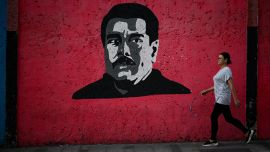Two months after his arrival at the Casa Rosada, Alberto Fernández’s government is beginning to outline its relationship with the Judiciary.
The relationship between the judges inside the Comodoro Py federal courthouse and the president, a well-respected law professor, is progressing smoothly – though without too many definitions. The government has not disclosed what the judicial reform it is working on consists of, nor exactly, though it is betting on Daniel Rafecas becoming the new attorney-general and has managed to appoint the new authorities of the Magistrate’s Council by agreement.
The recent death of Claudio Bonadio, the judge most criticised by Kirchnerismo, also marks the end of the era in the courts of Comodoro Py. There are those who understand that Bonadio’s absence will allow the relationship between Fernández’s administration and the country’s most powerful judges to decompress.
During last year’s presidential campaign, Fernández had said that there were judges who had to explain what they had done to “please” Mauricio Macri’s government. Among them, he cited Bonadio, Julián Ercolini, Martín Irurzun (the president of the Federal Court of Appeals) and two other judges from the Federal Cassation Courts.
After he’d made these statements, the president did not provide any more names. He did, however, say he was working on a judicial reform programme that would be sent to be analysed during the Congress’s period of extraordinary sessions.
So far, no-one knows what the bill includes.
VACANCIES
The courts inside the Commodore Py courthouse are a source of major power. The most serious crimes in Argentina and those involving government officials are investigated from inside its walls.
Bonadio, for example, was iconic in that he led and represented the judicial investigations against Cristina Fernández de Kirchner, even before she left the Pink House in 2015. “Without Bonadio, the relationship with the government changes,” said one federal judge, speaking anonymously.
Following the controversial federal judge’s death, the government will have to appoint two federal judges – Sergio Torres’ court is also vacant after he was elevated to the Supreme Court of Buenos Aires Province.
If Rafecas wins the two-thirds majority in the Senate needed to become Argentina’s next attorney-general – as the Fernández government hopes – it will have to appoint a third judge.
Meanwhile, in the Federal Court of Appeals, there are at least two vacancies. The government is also evaluating what to do with judges Pablo Bertuzzi and Leopoldo Bruglia, who were transferred to the appellate tribunal during the Macri’s administration.
Five slots are still waiting to be filled at the oral federal courts of Comodoro Py – the government will have to move forward with these appointments.
MAGISTRATES COUNCIL
“Let’s hope that in the next six months, judges can be appointed to replace Bonadio and Torres,” Judge Alberto Lugones confirmed Thursday in a conversation with Radio El Destape. Lugones is the new president of the Magistrates Council, the body in charge of selecting and removing judges.
The body held its first session of the year on Thursday, at which Lugones was elected to chair the council. He will be seconded by his colleague Ricardo Recondo, one of the leaders of the traditional Association of Magistrates, which is on good terms with Justice Minister Marcela Losardo.
The ‘manager’ of the agreement for the positions in the Council was Gerónimo Ustarroz, the Executive’s representative on the Council and foster brother to Interior Minister Eduardo “Wado” de Pedro. For years, De Pedro was Kirchnerismo’s key figure on the Council and one of the interlocutors with the Supreme Court.
President Fernández, for his part, has also ordered the withdrawal of 138 nominations for judges, prosecutors and public defenders sent to the Senate for confirmation by the previous administration. The government wants to review them on a case-by-case basis.
The new authorities will have to decide, for example, whether to maintain the nomination of Laureano Durán for Federal Court No. 1 in La Plata, with electoral jurisdiction over the entire province. Federal Judge Alejo Ramos Padilla, who is currently in charge of the high-profile investigation into illegal espionage involving pseudo-lawyer Marcelo D’Alessio and federal prosecutor Carlos Stornelli, had competed for and won that post.
The same decision will have to be made regarding the federalcourt in Lomas de Zamora, where the candidate is Juan Tomás Rodríguez Ponte, the executive director of the Supreme Court’s wire-tapping office. In Mercedes, the Macri government had nominated Ignacio Mahiques for the federal court. Ignacio is the son of Carlos Mahiques, a Federal Cassation Court judge and ex-justice minister in the María Eugenia Vidal administration in Buenos Aires Province, and the brother of Juan Bautista, a former member of Macri’s judicial board and current attorney-general for Buenos Aires City.
SUPREME COURT
On Talcahuano Street, the justices are waiting for signs from the government. They say they are not worried about the judicial reform. Sources also say that they are not preparing any high-impact rulings in the next few weeks and will seek to get resolutions through a vote of the five members of the body, which is sometimes difficult because of infighting.
Despite the debate among members of the government about the existence of political prisoners – in reference to Kirchnerite officials and leaders who have been brought to trial and imprisoned since the Macri administration – court sources say they are unaware of that discussion. “There is no case that is sufficiently advanced enough for the Court to rule soon,” sources confirmed.
Other issues are coming to the fore. The nation’s highest court has had the DAJuDeCO wiretapping office under its supervision since 2016, following a decree issued by Macri that sought to trim the power of then attorneygeneral Alejandra Gils Carbó.
However, on Monday, Judge Irurzun will finish his mandate as general director and will leave his position in the hands of Javier Leal de Ibarra, the chair of the Comodoro Rivadavia Federal Court of Appeals.
Although the change was foreseen, it will in turn equate to a loss of power for the judges of Comodoro Py, since Irurzun was one of their representatives. Moreover, he was the driving-force behind the judicial doctrine that allowed Kirchnerite officials to be arrested and held without convictions.
The wire-tapping office has been in the spotlight in recent years because of leaked conversations, especially those involving former president and current vice-president Cristina Fernández de Kirchner.
In June of last year, the Court issued a resolution ordering the judges to restrict the involvement of the Federal Intelligence Agency (AFI) in wire-taps. For example, the justices sought to limit the spies’ involvement in transcribing audio recordings.
Last month, the newly installed trustee at the AFI, Cristina Caamaño, issued a resolution along the same lines. Inside the DAJuDeCO, sources explained that the intervention of the intelligence agency had been reduced exponentially. Today, there is only one case in which the AFI intervenes and its participation was ordered by a judge concerned with economic crimes.
A KEY POSITION
In December, President Fernández nominated Rafecas to take over the Office of the Attorney General. The office has been in the hands of Eduardo Casal since October 2017, when Gils Carbó announced her resignation amidst a fierce dispute with the Macri administration.
Rafecas has been a federal judge since 2004 and is considered one of the major promoters of investigations into crimes against humanity committed during the last military dictatorship (1976-1983).
The judge has already successfully completed the first stage of the nomination. He obtained more than 650 endorsements, many of them from human rights organisations, and only four challenges. The government has yet to officially send his nomination to the Senate.
If Rafecas’ nomination passes through the upper chamber, he will have to implement the accusatory system, which leaves judicial investigations in the hands of the prosecutors, thereby reducing the power of judges. Change is afoot in Comodoro Py, it seems.


























Comments